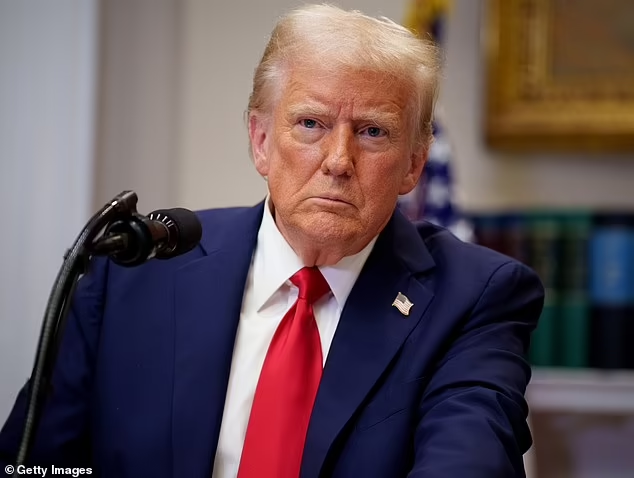BEDMINSTER, N.J. — President Donald Trump on Sunday called on Russia to immediately halt its military offensive in Ukraine and suggested that Ukrainian President Volodymyr Zelenskiy might be prepared to concede Crimea as part of a broader peace settlement with Moscow.

Speaking to reporters at his New Jersey golf club, Trump expressed disappointment that Russia had continued its assaults despite ongoing negotiations. His remarks came a day after he met privately with Zelenskiy at the Vatican while attending the funeral of Pope Francis, a meeting Trump described as “going well.”
Asked directly whether Zelenskiy might be willing to give up Crimea — the Black Sea peninsula annexed by Russia in 2014 — Trump replied, “Oh, I think so, yeah. Look, Crimea was 12 years ago.” Trump then turned his criticism toward his Democratic predecessors, blaming former Presidents Barack Obama and Joe Biden for allowing Russia to seize Crimea “without a shot being fired.”
“So, don’t talk to me about Crimea. Talk to Obama and Biden about Crimea,” Trump said. “And remember, this is Biden’s war. This isn’t Trump’s war. I came in to try and solve a problem. And the problem is so many people are being killed.”
Current U.S. proposals for ending the nearly three-year conflict reportedly involve offering de facto recognition of Russian control over Crimea and other occupied Ukrainian territories. This contrasts sharply with Ukrainian and European proposals, which insist on postponing any discussion of territorial status until after a ceasefire is established.
Trump, who has emphasized the need for a swift resolution, portrayed Zelenskiy as increasingly pragmatic. “I see him as calmer,” Trump said. “I think he understands the picture, and I think he wants to make a deal.”
Meanwhile, U.S. Secretary of State Marco Rubio signaled growing impatience with the stalled negotiations. Speaking on NBC’s Meet the Press Sunday, Rubio warned that the United States could pull back from its mediation efforts if significant progress is not made soon. “It needs to happen soon,” Rubio said. “We cannot continue to dedicate time and resources to this effort if it’s not going to come to fruition.”
Trump’s face-to-face with Zelenskiy marked their first meeting since a tense encounter at the White House in February, and comes amid urgent international efforts to halt the bloodshed. Their meeting at a Vatican basilica was seen as a critical step in reviving peace talks that have faltered in recent months.
Following the Vatican talks, Trump issued a rare public rebuke of Russian President Vladimir Putin, criticizing ongoing missile strikes against Ukrainian civilian areas. “There is no reason for Russia to shoot missiles into civilian areas,” Trump wrote on social media Saturday night.
Despite Trump’s appeal, Russian Foreign Minister Sergei Lavrov defended Moscow’s military strategy during a pre-taped interview aired on CBS’s Face the Nation. Lavrov insisted Russia targets only sites with military relevance, even in cases where civilian casualties have occurred. Referring to a deadly strike on Kyiv last week, Lavrov claimed, “The target attacked was not something absolutely civilian.”
On Sunday, Zelenskiy reported that Russia had conducted nearly 70 attacks in a single day, underlining the intensity of the ongoing conflict. “The situation at the front and the real activity of the Russian army prove that there is currently insufficient pressure on Russia from the world to end this war,” Zelenskiy wrote on Telegram.
European allies, including Germany, have voiced skepticism about the U.S. approach to ending the war. German Defense Minister Boris Pistorius warned Sunday that Ukraine should not agree to Washington’s proposal, saying it risked sacrificing too much Ukrainian territory for the sake of a ceasefire.
Inside the Trump administration, officials continued to express frustration with both sides. National Security Adviser Mike Waltz said Trump remains determined to broker a deal, despite setbacks. Waltz also indicated that discussions between the United States and Ukraine would eventually address access to Ukraine’s rich reserves of rare earth minerals, seen as critical to future economic stability.
Democrats in Washington, meanwhile, raised alarms about Trump’s stance toward Russia. Senate Majority Leader Chuck Schumer said he fears Trump could “cave in to Putin,” warning that abandoning Ukraine would be a “moral tragedy” after years of Western support and sacrifice.
“To just abandon Ukraine, after all the sacrifice that they made, after so much loss of life, and with the rallying of the whole West against Putin, it would just be a moral tragedy,” Schumer said during an appearance on CNN’s State of the Union.
As Russia’s offensive grinds on and international pressure mounts, the path forward for Ukraine remains fraught — with Trump, now at the center of peace efforts, navigating a fragile and deeply contentious diplomatic landscape.



